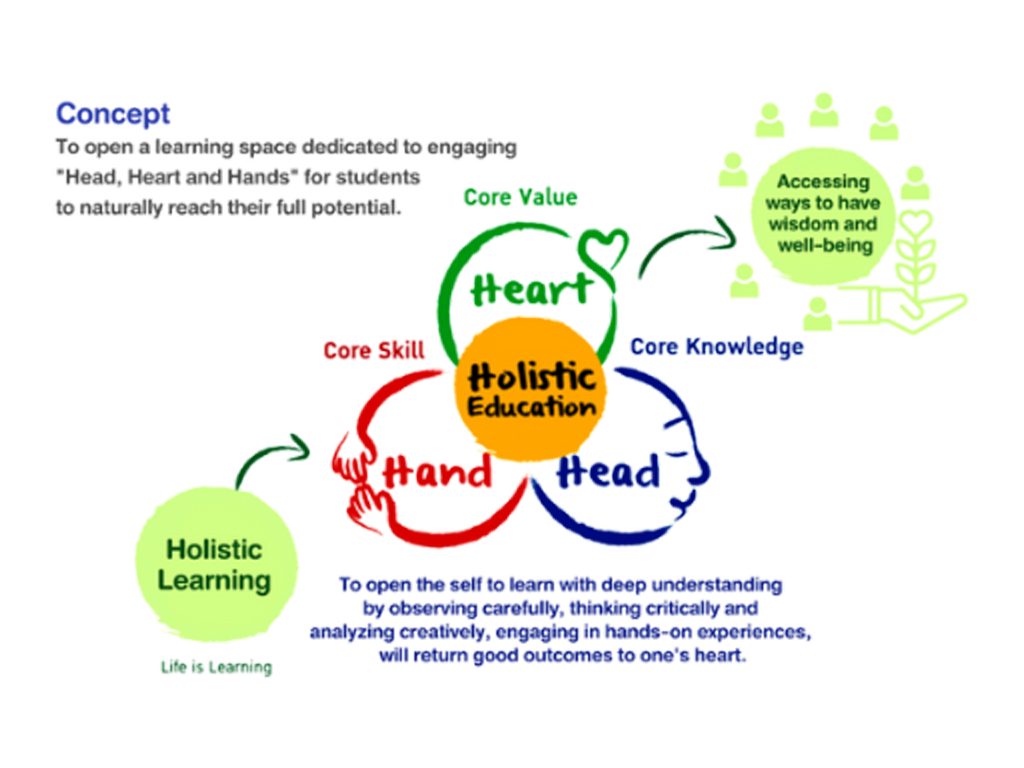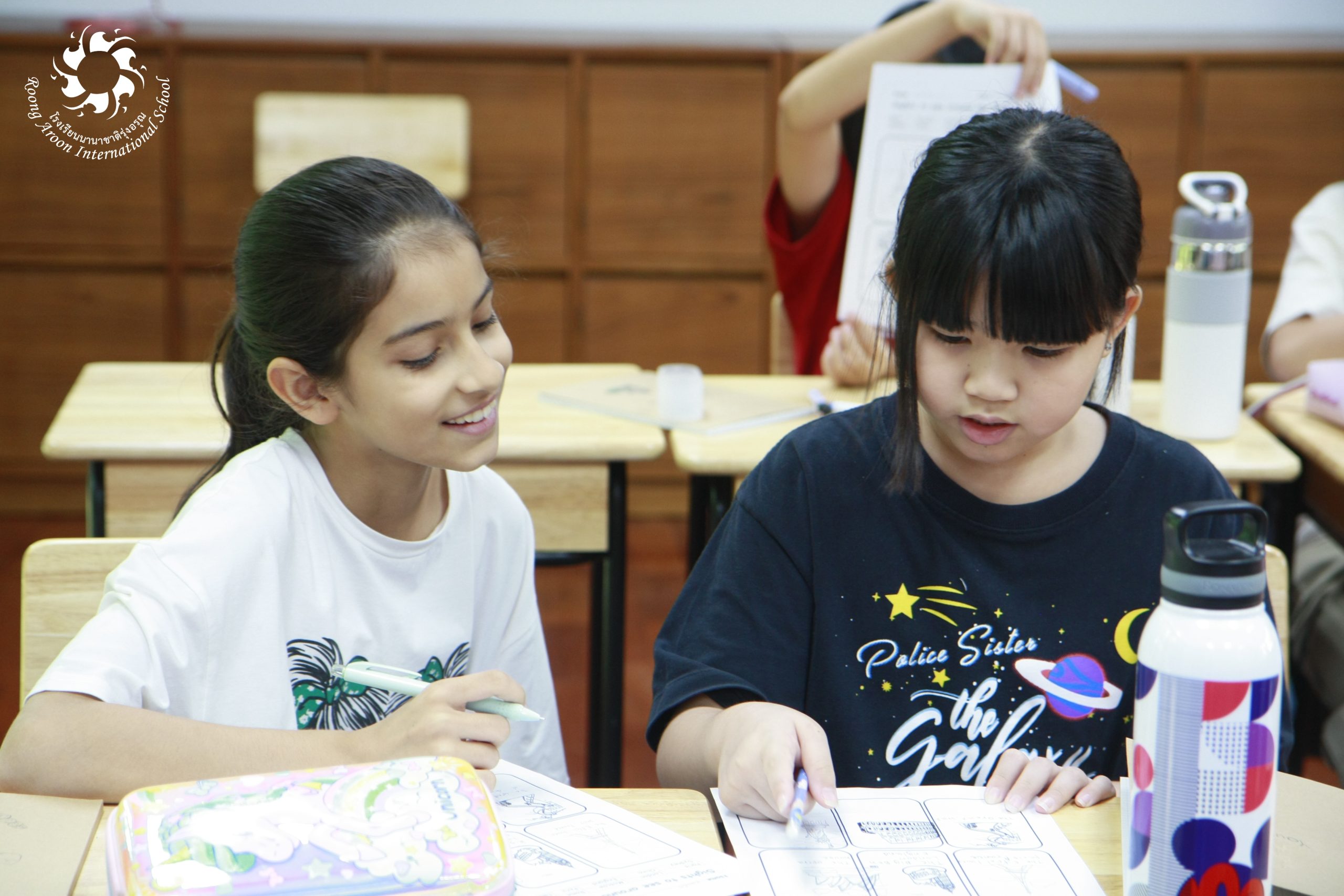A Way of Life
Roong Aroon International School aims to provide inquiry-based, experiential learning opportunities for students with a holistic approach. In this way of life, students develop recognition of their roles in different communities and practice collaboration through undertaking various activities that develop essential life skills.
Through cooking lunch for their classmates and teachers two times a week, being responsible for cleaning and maintaining their learning environment, and joining in various school events, students are able to gain independence, self-awareness, and self-responsibility. Meanwhile, we recognize that a student’s ability to learn well is dependent on the individual and not on their attire. Therefore, the school allows students to wear polite casual attire on certain days while maintaining a sense of community, students are still required to wear school uniforms twice a week.

Furthermore, students undertake field study trips each trimester. These experiences provide hands-on activities that develop students’ curiosity, critical thinking, compassion, and research skills beyond classroom learning. Students are challenged – and challenge themselves – to understand the world they live in through observation, communication, and inquiry.
Holistic Learning

Roong Aroon International School is unique and different from other schools in terms of Holistic Learning. We teach using the International Baccalaureate programme alongside allowing students to explore the holistic learning methods. The holistic learning practice that integrates learning contexts that nurture insight and awareness, cultivating sustainable relationships between individuals and the environment as a whole.
The 3 Important Modes of Holistic Learning Practices
1. Deep Learning
Aiming – to nurture one’s inner learning capacity
Promoting – wisdom-based learners
Practicing – mindfulness cultivation, self-reflection, mediation, spiritual arts, public volunteer services
2. Learning by Doing
Aiming – to practice with hands-on activities in a real situation
Promoting – self-directed and self-reliance learners
Practicing – learning activities units which include problem solving, projects, and research integrated with real-life experiences
3. Communicative Learning
Aiming – to share knowledge and understanding in creating a learning organization or community of practice
Promoting – sustainable social engagement and fostering learning partnerships
Practicing – group learning, discussions, dialogue, knowledge management, community sharing, meetings, people mapping, and presentations
Experiential Learning

At Roong Aroon International School, students are required to take responsibility for their learning community and environment. This involves simple service work such as cooking lunch for their class and teachers, participating in the school’s recycling program and so on. These activities help students understand the importance of citizenship duties and responsibilities, action, and collaboration, while also developing important life skills.
Field Study
We aspire to provide “challenging, varied instructional strategies” – this is a focus and something which we are consistently working on developing and improving. Teachers are encouraged to get students involved and outside of the classroom as often as possible for learning activities; our field studies are experiential learning and develop community engagement of students with people very different from themselves; real-world connected.
In all IB programmes, the inquiry cycle is utilized in various ways, including exploring concepts, developing ATL skills, planning units, designing products, and engaging in experiential learning. The inquiry cycle comprises three elements: inquiry, action, and reflection.
Challenging learning environments help students develop the imagination and motivation they need to meet their own needs and the needs of others. Principled action involves making responsible choices, sometimes including decisions not to act. Individuals, organizations, and communities can engage in moral action by exploring the ethical dimensions of personal and global challenges.
Service Action
At Roong Aroon International School, students are required to take responsibility for their learning community and environment. This involves simple service work such as cooking lunch for their class and teachers, participating in the school’s recycling program and so on. These activities help students understand the importance of citizenship duties and responsibilities, action, and collaboration, while also developing important life skills.

Self Development
RAIS is a school that practices holistic education as a way to transform students “from being ‘a person who knows’ to being ‘a person who is’” as our school founder, Associate Professor Prapapat Niyom, described and as included in our school vision and mission statement. The statement outlines that our goal is for all community members to
- Develop self-awareness and mindfulness
- Take action and employ knowledge to confront problems and solve social issues
- Be selfless and ready to make sacrifices for the common good, to improve society, nature and the environment.
This mindset relates to the holistic pedagogical approach as summarised by John P. Miller:
Holistic education focuses on the relationship between the whole and the part and suggests that teaching and learning approaches need to be rooted in a larger vision. If techniques are isolated and unrelated they can become dysfunctional. The holistic vision includes a sense of the whole person who is connected to his or her surrounding context and environment.

Our Social-Emotional Learning (SEL) curriculum encompasses community responsibility with the growth of self-awareness through the development of mental, emotional and interpersonal skills. This curriculum is still evolving and includes elements from “Pedagogy for Transformation”, by Victoria Subirana, who was a consultant with us during our first two years of operations, as well as Buddhist teachings and dhamma practices facilitated by Khru Ba Anh (Mahayano Bhikku).
Practices of compassion, empathy, conflict resolution, and self-management are taught explicitly in extended homeroom sessions. In the year 2023 -2024, this course has been developed to be a Self-Development class. Through these activities, students learn how to take care of themselves and others and how to balance their emotions.




